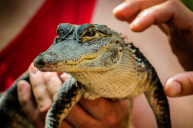I feel like every year I write about a different person getting mauled by an alligator. Sometimes, it's more than one. But perhaps, we've been too harsh to blame the reptiles for only doing what's in their nature. It turns out that most of the alligator attacks have only one thing to blame.
And that's people. That's right, the victims of gator attacks are often the ones to blame for getting themselves in that predicament. As they say, f—k around and find out. Well, a lot of people find out in that regard. A new study published the journal Human-Wildlife Interactions found that 96 percent of recorded alligator attacks were due to human activity.
This was due to either "human inattention" or "risk-taking" prior to the attack.
"I wondered if crocodilians had an unwarranted reputation for attacks the same way snakes do," said Mark Teshera, lead author of the study and a biology professor at Center College, in a press release. "It was important to create a ranking system for risky human behaviors because it showed that the overwhelming majority of bites stemmed from some level of humans engaging in risky behavior in places where alligators live. Therefore, we should not call these encounters 'attacks.'"
Alligator Attacks
Basically, these researchers took a look at hundreds of years worth of alligator attacks. Based upon the interactions, they ranked whether the human bevior risk was low, moderate, high, or potentially no risk at all. Almost all attacks preceded at least moderate-risk behavior. This ranged from swimming in alligator-infested rivers to not being aware of their surroundings.




